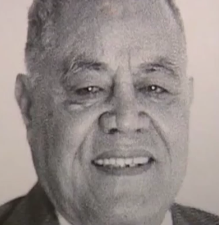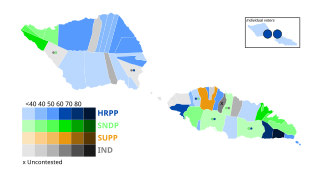
Politics of Samoa takes place in a framework of a parliamentary representative democratic state whereby the Prime Minister of Samoa is the head of government. Existing alongside the country's Western-styled political system is the fa'amatai chiefly system of socio-political governance and organisation, central to understanding Samoa's political system.

The Human Rights Protection Party is a Samoan political party. It was founded in 1979 and dominated Samoan party politics for decades thereafter, leading every government until their defeat in 2021.

Fiamē Mataʻafa Faumuina Mulinuʻu II was a Western Samoan paramount chief and politician. The holder of the Mataʻafa title, one of the four main Samoan chieftainships, he became the first prime minister of Western Samoa in 1959, serving until 1970. He held the position again from 1973 until his death in 1975.
Matatumua Maimoana (1935–2012), also known as Matatumua Maimoaga Vermeulen, was a matai, politician, Nurse and Environmentalist of Samoa. Her chief title, Matatumua, was an orator's title from the village of Faleasiu. She was a former member of parliament in Samoa and the founder of the Samoa All People's Party (SAPP), becoming the first woman to lead a political party in the country. SAPP allowed people as young as 16, regardless of gender or whether they were matai to be officers in the organisation which included village branches. She was a founding member of the Human Rights Protection Party (HRPP), which has dominated Samoan politics in the last two decades.

Tui Ātua Tupua Tamasese Tupuola Tufuga Efi is a Samoan political leader and as holder of the maximal lineage Tama-a-'āiga title of Tupua Tamasese, is one of the four paramount chiefs of Samoa. He also holds the royal pāpā title of Tui Atua.

Vaʻai Kolone was the fourth prime minister of Samoa and a founder of the Human Rights Protection Party (HRPP) in Samoa. He served as Prime Minister twice, first between 13 April and 18 September 1982, and then from 30 December 1985 until 8 April 1988.

The Christian Democratic Party (CDP) was a political party in Samoa. The party was founded in February 1985 by the supporters of former Prime Minister Tupuola Taisi Tufuga Efi. At the 1985 election the party won only 15 of 47 seats, but was able to form a coalition government in December 1985 after 11 Human Rights Protection Party MPs crossed the floor to vote against the budget of then-Prime Minister Tofilau Eti Alesana. Va'ai Kolone became Prime Minister. While apparently retaining a majority after the 1988 election, the party lost power after the defection of Tanuvasa Livigisitone to the HRPP.

General elections were held in Samoa on 2 March 2001 to determine the composition of the 13th Parliament. Prime minister Tuilaʻepa Saʻilele Malielegaoi led the Human Rights Protection Party (HRPP) into the election. Opposition leader and former prime minister and future head of state, Tui Ātua Tupua Tamasese Efi led the Samoan National Development Party (SNDP) into the election. The HRPP won 23 seats, but initially fell short of a majority. The SNDP won 13 seats, the Samoan United People's Party secured one seat and the remaining 12 were won by independents. Following the election, all 12 independents joined the HRPP, giving the party a majority in parliament and allowing Tuila'epa to remain prime minister.

General elections were held in Western Samoa on 22 February 1985. Voting was restricted to matai and citizens of European origin, with the Matai electing 45 MPs and Europeans two. The result was a victory for the Human Rights Protection Party, which won 31 seats. Its leader, Tofilau Eti Alesana, remained Prime Minister.

General elections were held in Samoa on 4 March 2011, to determine the composition of the 15th Parliament. Two parties contested the election, the ruling Human Rights Protection Party (HRPP), which had been in power for most of the time since 1982, led by Prime Minister Tuilaʻepa Saʻilele Malielegaoi and the newly founded Tautua Samoa Party (TSP) led by Vaʻai Papu Vailupe, which several minor parties had merged into. The election occurred following amendments to the electoral act in 2009, including the introduction of the Monotoga law, a requirement for aspiring candidates to dedicate traditional village service and commitments. As a result, three TSP aspiring candidates, including a challenger for the prime minister's seat, were disqualified by the Supreme Court for failing to satisfy this law.

General elections were held in Western Samoa on 25 February 1967. All candidates ran as independents and voting was restricted to Matai and citizens of European origin, with the Matai electing 45 MPs and Europeans two. Following the election, Fiame Mata'afa Faumuina Mulinu'u II remained Prime Minister.

General elections were held in Western Samoa on 7 February 1970. All candidates ran as independents, with voting restricted to matais and citizens of European origin, with the matais electing 45 MPs and Europeans two. Following the election, Tupua Tamasese Lealofi IV became Prime Minister.

General elections were held in Western Samoa on 24 February 1973. All candidates ran as independents and voting was restricted to matai and citizens of European origin, with the matai electing 45 MPs and Europeans two. Following the election, Fiame Mata'afa became Prime Minister for a second term, having previously held the office between 1959 and 1970.

General elections were held in Western Samoa on 21 February 1976. All candidates ran as independents and voting was restricted to Matai and citizens of European origin, with the Matai electing 45 MPs and Europeans two. Following the election, Tupuola Efi became Prime Minister.

General elections were held in Western Samoa on 27 February 1982. The Human Rights Protection Party won 22 of the 47 seats in the Legislative Assembly and was able to form a government after three independents voted for its leader, Va'ai Kolone, in the vote for Prime Minister.

General elections were held in Western Samoa on 26 February 1988. Voting was restricted to Matai and citizens of European origin, with the Matai electing 45 MPs and Europeans two. Although the Human Rights Protection Party received more than double the number of votes of the Coalition of the Christian Democratic Party and the Va'ai Kolone Group, it won one fewer seat. However, on the day of the election of the Prime Minister by Parliament, one Coalition MP defected to the HRPP, allowing its leader Tofilau Eti Alesana to be elected Prime Minister.

Tui Ātua Tupua Tamasese Lealofi IV was the second prime minister of Samoa from 25 February 1970 to 20 March 1973 and again from 21 May 1975 to 24 March 1976. He held the title of Tupua Tamasese, one of the four main chiefly titles of Samoa from 1965 until his death in 1983.
Afioga Lesatele Rapi was a Western Samoan chief and politician. He was a member of the Legislative Assembly and served in the cabinet three times between 1967 and his death.

Leota Leuluaiali'i Ituau Ale was a Samoan politician. He was a member of the Legislative Assembly in three spells from 1970 to 1996 and served as Speaker from 1976 to 1979.

The deputy prime minister of the Independent State of Samoa is the deputy head of government of Samoa. The deputy prime minister is a member of the Legislative Assembly and cabinet, and is appointed by the O le Ao o le Malo on the advice of the prime minister. The incumbent, Tuala Iosefo Ponifasio of the Faʻatuatua i le Atua Samoa ua Tasi (FAST) party, has served since 2021. His role was disputed from 24 May to 23 July due to the 2021 constitutional crisis, which was resolved when the Samoan Court of Appeal ruled that the FAST government was legitimate.









